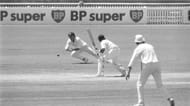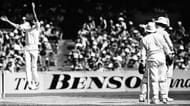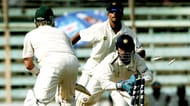Later this year, India will have a superb chance to win their first Test series in Australia.
India are currently at the top of the ICC's Test Rankings, they have a captain in superb form, and a squad with plenty of depth. Australia, meanwhile, are looking very fragil as they continue to struggle in the wake of the infamous ball-tampering incident.
Yet history is against India. This is because, despite the two sides having one of the fiercest rivalries in cricket, Test series between the pair tend to be dominated by the home side. In addition to India's failure to win in Australia, this is shown by Australia having only won once in India since 1970.
A series win in Australia would, therefore, be particularly momentous for this Indian side.
However, there have been a handful of occasions when India has been painstakingly close to achieving this milestone.
#4 1977-1978, Australia win 3-2

This was the first series after Australia's best players had departed from the Test side to be part of Kerry Packer's World Series Cricket.
Because of their departure, Australia was left with a very unproven side, with the only experienced Test level players in the team being Jeff Thompson, and Bob Simpson, who hadn't played for Australia since 1968.
India, meanwhile, had a formidable side. They were led by Bishen Bedi, whose spin partnership with Bhagwat Chandrasekhar proved fruitful despite the unfavourable conditions. They also had a well-stocked batting lineup that was spearheaded by Sunil Gavaskar.
Australia had the advantage of familiar conditions, but there was little doubt India had the stronger side.
In fact, over the five Tests, it could be argued that India proved they were the superior side. Had India won just a few more key moments they could have won the series 5-0.
This may seem a preposterous assertion, but looking into the individual matches suggests otherwise. Not only were India's two victories games they won by significant margins, but in the other three games, they came excruciatingly close.
The first of these games saw Australia win by a poultry 16 runs. Here India started the game by dismissing Australia for just 166, only to be bowled out for 153 themselves. Both sides batted better in their second innings, and had Sunil Gavaskar, the only century-maker of the game, had more support with the bat, India would have almost certainly won.
Nevertheless, the following game they came just as close, only losing by two wickets. In this match, Bedi actually declared in the second innings, albeit with his team already nine wickets down.
However, by either a stroke of luck or a stroke of genius, Australia put Anthony Mann in as nightwatchmen and never looked back. Mann scored a century that propelled Australia to their target of 339, he would never reach 30 again.
India's two wins came after this match and coming into the final Test of the series they certainly seemed to have the momentum. But, despite an admirable fourth innings battle, India fell 47 runs short of their 493 run target.
The India side must have returned home wondering how they hadn't emerged from the series as victors, yet they wouldn't have to wait long for their next chance.
#3 1980-1981, Drawn 1-1

This was a three-match series where India started slow but finished brilliantly.
With World Series Cricket over, and Australia's star players returning to the side, the 1980-1981 tour of Australia posed a very different challenge to India.
India no longer had the spin duo of Bedi and Chandrasekhar to torment the Australians, although the emergence of Kapil Dev was certainly a bonus.
However, despite Kapil Dev taking 5/96, Australia would only need to bat once in the first test, with a Greg Chappell double century leading Australia to an innings victory.
Next, in Adelaide, it was Kim Hughes's turn to make a double-century, with Australia batting first and posting an imposing 528.
India would show resolve when they batted, with Sandeep Patil making 174 in a fantastic counter-attacking inning, but despite this, they would only narrowly escape defeat, with a torrid second inning leaving Australia just two wickets from victory.
A series win was out of the equation in the third test, but India showed what could have been as they produced one of the best comebacks in test cricket.
After both sides had batted for the first time, India trailed by 182 runs. Their second innings score of 324 gave them hope, but not much, as they would have to bowl the Australian's out for under 142 runs.
However, a superb Kapil Dev spell saw Australia crumble for just 83, meaning India had tied the series.
It may have felt like India had salvaged a series draw, but if it had not been for two mammoth innings by Chappell and Hughes, the series could have looked very different.
Furthermore, Sunil Gavaskar, the Indian batsman most post these types of scores, ended the series with an average under 20.
His form was subsequently a decisive factor in the series, although, five years later his runs would very nearly see India finally win a Test series in Australia.
#2 1985-1986, Drawn 0-0

Here India's failure to win the series could not be attributed to a lack of cutting edge, nor a failure to stop opposition batters amassing huge scores. It was simply down to luck.
India had the better of Australia in all the three Tests. They led in the first innings of each game by 139, 183, and 204 runs respectively, but were unable to force a result in any of the games.
This was largely due to poor weather, which intervened in the first two games.
Kapil Dev also criticised the umpires after the second test, when Allan Border was contentiously given not out early in the third innings.
Dev's frustration was compounded by Border going on to make an exceptional 163. His innings was particularly impressive for the fact that no other Australian batsman even passed 20 in this innings.
India themselves had some brilliant individual performers throughout the series. Gavaskar was chief among these, averaging 117.33 over the three tests.
Yet if they could be blamed for anything it was their four dropped catches in the first test. Though even then, the weather meant this would have been unlikely to change the result.
India, therefore, went home having battered a struggling Australian side but remarkably having not won a single Test.
#1 2003-2004, Drawn 1-1

Almost 20 years on and Australia were anything but struggling. They were missing Shane Warne and Glenn McGrath, and even with them they may not have been as strong as the side that won 16 consecutive games from 1999-2001, but they were still an imposing side.
Yet it was India who had ended that 16 game streak through VVS Laxman and Rahul Dravid's miracle in Kolkata.
They too had a strong side, with one of the finest batting lineups in India's history.
The four-match series was full of big scores. The series would include four double centuries - two from Ricky Ponting, and the others from Dravid and Sachin Tendulkar - and would also see no bowler except for Anil Kumble average under 35.
The first test was an evenly matched draw, but the second saw India take a priceless series lead with a four-wicket win in Adelaide.
Here India responded perfectly to Australia's considerable first innings score of 556. Not only would Laxman and Dravid bring back memories of Kolkata with a 303 run-partnership, but they would follow this by bowling Australia out for under 200 in the next innings.
Ajit Agarkar was the main instigator here, as he took a career best 6/41. But all the Indian bowlers were made to toil in the next test.
The Boxing Day test in Melbourne was a very one-sided affair. Australia won by nine wickets and would have won even more easily if not for a blistering 195 by Virender Sehwag.
But it was Ponting's career best of 257 that ensured the series was level, and also meant that anybody could win going into Sydney.
Yet Sydney simply provided another game for India to wonder what could have been.
This is because of a very contentious decision from India's captain Sourav Ganguly.
India won the toss and batted first, but it was only on the morning of day three that Ganguly eventually declared, with his side on 705.
This can be seen as shrewd captaincy, as having won the previous series in 2001 meant that a draw would see India retain the Border-Gavaskar Trophy. But it also severely hampered India's chances of getting the first series win in Australia.
The game would end with India four wickets from victory, having declared at 2/211 in their second innings.
This match is largely remembered as being Steve Waugh's last, but its historical context is much greater, as it provided India with one of their best chances to win a series in Australia.
15 years later and achieving this has still proved an insurmountable task for India.
However, the state the two sides are currently in suggests that India may finally overcome this barrier when they next meet. If not, it may be some time before an equally favourable opportunity arises.
Brand-new app in a brand-new avatar! Download Cric Rocket for fast cricket scores, rocket flicks, super notifications and much more!
